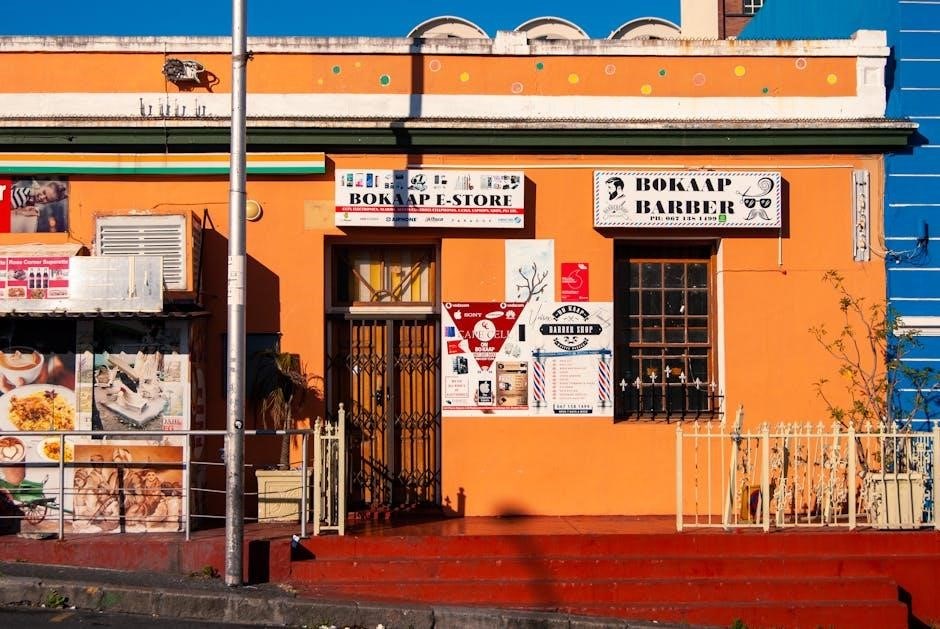Angolan literature reflects the nation’s rich cultural heritage, blending traditions and modern influences. Notable writers like José Luandino Vieira and Pepetela have shaped its unique narrative voice, exploring identity, history, and society through compelling stories. Their works, such as Vieira’s A cidade e a infância and Pepetela’s Mayombe, highlight the struggles and triumphs of Angolan life. These literary contributions are now widely accessible through PDF resources, preserving and sharing the country’s literary legacy globally.
1.1 Early Beginnings of Angolan Literary Tradition
The roots of Angolan literature trace back to oral traditions, with stories, poems, and proverbs passed down through generations. Early written works emerged in the 19th century, influenced by Portuguese colonial education. Writers like José da Silva Maia Ferreira began blending African oral narratives with European literary styles. These pioneers laid the groundwork for a unique literary identity. Their works often explored themes of culture, identity, and social issues, reflecting the complexities of Angolan society. This foundational period set the stage for the development of a vibrant literary tradition that would later flourish during the colonial and post-independence eras.

Colonial Era and Its Influence on Angolan Writers
The colonial period deeply shaped Angolan literature, as writers like José Luandino Vieira and Pepetela reflected on the struggles of identity and resistance. Their works, such as A cidade e a infância and Mayombe, captured the socio-political tensions, inspiring a national consciousness. This era marked a turning point in Angolan literary history, blending African traditions with European influences and fostering a unique narrative voice. The colonial experience became a central theme, influencing themes of freedom and cultural preservation. These works are now widely accessible through PDF resources, preserving their historical and literary significance.
2.1 The Role of National Identity in Literature
Angolan literature often explores themes of national identity, reflecting the country’s colonial past and post-independence struggles. Writers like José Luandino Vieira and Pepetela use their works to highlight Angola’s cultural heritage and the resilience of its people. Their stories frequently incorporate local traditions, languages, and historical events, creating a sense of shared identity. This literary focus on national identity has been crucial in preserving Angola’s cultural legacy and fostering pride among its citizens. By blending African traditions with European influences, Angolan authors have crafted a unique narrative voice that resonates globally. Their works, now accessible through PDF resources, continue to inspire future generations.
2.2 Anti-Colonial Resistance Through Literary Works
Angolan literature has long been a powerful tool for expressing anti-colonial resistance. Writers like José Luandino Vieira and Pepetela used their works to critique colonial oppression and inspire national pride. Vieira’s A vida verdadeira de Domingos Xavier exposed the harsh realities of colonial rule, while Pepetela’s Mayombe depicted the struggles of Angolan people under Portuguese dominance. These narratives not only challenged colonial narratives but also empowered locals to envision a free future. By giving voice to the marginalized, Angolan authors played a pivotal role in the fight for independence. Their works, now widely available in PDF formats, remain vital in understanding the nation’s history and its people’s resilience.

Post-Independence Literature in Angola
Post-independence Angolan literature explores themes of reconstruction, identity, and social change. Writers like Pepetela and José Eduardo Agualusa reflect on the nation’s journey, blending history with contemporary issues.
3.1 The Struggle for Freedom and Its Reflection in Writing
The struggle for freedom deeply influenced Angolan literature, as writers reflected on the nation’s turbulent history and the quest for independence. Authors like Pepetela, in works such as Mayombe, depicted the MPLA’s fight against colonial rule, blending historical narratives with fictional accounts. José Eduardo Agualusa’s The Book of Chameleons explores themes of identity and memory, echoing the nation’s journey toward liberation. These writings not only preserved the collective memory of Angolans but also served as a catalyst for national unity. Through their works, these writers captured the resilience and determination of a people striving for freedom, leaving a lasting legacy in Angolan literary history. PDF resources now make these works widely accessible, ensuring their impact endures.
3.2 Emerging Voices in the Post-Colonial Period
The post-colonial era in Angola witnessed the rise of fresh literary voices, enriching the nation’s cultural landscape. Writers like Kalaf Epalanga and Djaimilia Pereira de Almeida emerged, bringing unique perspectives to Angolan literature. Their works often explored themes of identity, social change, and the complexities of modern life. Kalaf Epalanga’s O País dos Quiábos and Djaimilia Pereira de Almeida’s Esperança com Vida showcased the diversity of experiences in post-independence Angola. These voices not only reflected the aspirations of a younger generation but also challenged traditional narratives. Their contributions are now widely accessible through PDF resources, ensuring their stories reach global audiences and preserve the evolving legacy of Angolan literature.

Notable Angolan Writers and Their Works
Angola’s literary landscape is enriched by prominent writers like José Luandino Vieira, Pepetela, and José Eduardo Agualusa. Their works, such as A cidade e a infância and Mayombe, are widely celebrated.
4.1 José Luandino Vieira: A Pioneering Figure
José Luandino Vieira is a cornerstone of Angolan literature, celebrated for his vivid portrayals of local life and culture. His seminal work, A cidade e a infância (1957), captures the essence of urban childhood, while A vida verdadeira de Domingos Xavier (1961) delves into the struggles of colonial Angola. Vieira’s writing often reflects the socio-political realities of his time, blending lyrical prose with deep emotional resonance. His contributions have not only shaped Angolan literary identity but also gained international acclaim. Today, his works are accessible in PDF formats, preserving his legacy and making his stories available to a global audience. Vieira remains a pivotal figure, inspiring future generations of writers.
4.2 Pepetela: A Contemporary Literary Giant
Pepetela, one of Angola’s most celebrated writers, has left an indelible mark on its literary landscape. His works, such as Mayombe (1980) and O Quase Segredo (1988), explore themes of identity, colonialism, and post-independence struggles. Pepetela’s writing often blends historical narratives with social critique, offering profound insights into Angolan society. His novel O Desejo de Kianda (1995) delves into the complexities of cultural hybridity and urban life. As a key figure in contemporary Angolan literature, Pepetela’s works are now widely accessible in PDF formats, ensuring his stories reach global readers. His contributions continue to inspire new generations of writers and scholars alike.
4.3 José Eduardo Agualusa: Bridging Tradition and Modernity
José Eduardo Agualusa stands as a pivotal figure in modern Angolan literature, seamlessly merging traditional storytelling with contemporary themes. His works, such as The Book of Chameleons (2003) and A General Theory of Oblivion (2012), have garnered international acclaim. Agualusa’s writing often explores identity, memory, and the interplay between Angola’s past and present. His unique narrative style, blending historical fiction with magical realism, has captivated readers worldwide. PDF versions of his books, including Barroco Tropical (2009), are widely available, making his works accessible to a global audience. Agualusa’s ability to bridge tradition and modernity has solidified his reputation as one of Angola’s most innovative and celebrated writers.

Contemporary Angolan Literature
Contemporary Angolan literature thrives with a new generation of writers, blending traditional themes with modern narratives. Works by Pepetela, Agualusa, and Ondjaki are now widely accessible in PDF formats, reaching global audiences.
5.1 The Rise of New Generation Writers
A new wave of Angolan writers is emerging, bringing fresh perspectives to the literary scene. Names like Djaimilia Pereira de Almeida and Kalaf Epalanga are gaining prominence, exploring themes of identity, culture, and social change. Their works often blend traditional Angolan storytelling with modern narratives, reflecting the complexities of contemporary life. This generation is pushing boundaries, experimenting with language and form, and addressing issues like gender, race, and urbanization. Their stories resonate both locally and internationally, contributing to a vibrant cultural dialogue. The accessibility of their works through PDF formats has further amplified their reach, introducing Angolan literature to a global audience.
5.2 Global Recognition and Acclaim
Angolan literature has gained significant international recognition, with writers like José Eduardo Agualusa and Pepetela earning acclaim worldwide. Agualusa’s works, such as The Book of Chameleons, have won prestigious awards like the International Dublin Literary Award, showcasing Angola’s literary talent globally. Pepetela’s novels, including Mayombe, have been translated into multiple languages, highlighting the universal appeal of Angolan storytelling. This global recognition not only elevates individual writers but also puts Angolan culture on the world stage. The availability of their works in PDF formats has further facilitated their reach, making it easier for international readers to explore and appreciate Angolan literature. This growing acclaim underscores the richness and diversity of Angola’s literary contributions.
Cultural and Social Themes in Angolan Literature
Angolan literature explores themes of identity, history, and societal issues, reflecting the nation’s collective memory and cultural richness. Writers delve into the human condition, addressing social inequalities and cultural heritage through their works.
6.1 Exploring Identity, History, and Society
Angolan literature profoundly explores themes of identity, history, and society, reflecting the nation’s complex past and cultural richness. Writers like José Luandino Vieira and Pepetela craft stories that delve into the struggles of colonialism, independence, and post-colonial challenges. Their works often highlight the resilience of Angolan people, blending traditional values with modern realities. Historical narratives are woven into fictional tales, preserving collective memory while addressing contemporary issues. Social themes such as inequality, cultural identity, and the impact of political change are central to these stories. Through their writing, Angolan authors provide a window into the soul of their nation, offering insights into its diverse heritage and ongoing societal evolution.
6.2 Addressing Social Issues Through Stories
Angolan literature serves as a powerful medium for addressing social issues, with writers using storytelling to critique inequality, corruption, and cultural dislocation. Authors like Pepetela and José Eduardo Agualusa explore themes such as urban poverty, gender roles, and political corruption, offering nuanced perspectives on societal challenges. Their works, such as Pepetela’s Mayombe and Agualusa’s O Ano em que Zuma Perdeu a Grande Guerra, highlight the struggles of everyday life while advocating for change. By weaving social commentary into their narratives, these writers shed light on Angola’s complexities, inspiring dialogue and fostering empathy. Their stories not only entertain but also educate, making them vital tools for societal reflection and reform.

Digital Access to Angolan Literary Works
The rise of digital platforms has made Angolan literature more accessible globally. PDF resources now preserve and share works by writers like José Luandino Vieira and Pepetela, ensuring their legacy endures.
7.1 The Role of PDF Resources in Preserving Literature
PDF resources have become a vital tool in preserving Angolan literary works, ensuring their accessibility to a global audience. These digital formats allow timeless classics by authors like José Luandino Vieira and Pepetela to be easily shared and archived. By converting seminal texts into PDFs, their cultural and historical significance is safeguarded for future generations. This format also enables wider dissemination, breaking geographical barriers and fostering a deeper understanding of Angolan culture. Moreover, PDFs facilitate educational and research efforts, making it easier for scholars and enthusiasts to explore the rich tapestry of Angolan literature. This digital preservation ensures that the legacy of these writers remains vibrant and accessible worldwide.
7.2 Making Angolan Literature Accessible Worldwide
The global accessibility of Angolan literature has been significantly enhanced through digital platforms and PDF resources. These formats allow the works of renowned authors like José Eduardo Agualusa and Pepetela to reach readers beyond Angola’s borders. By making these texts available online, a broader audience can engage with the unique narratives and cultural insights they offer. This accessibility not only promotes cross-cultural understanding but also introduces readers to the richness of Angolan storytelling. The digital dissemination of these works ensures that Angolan literature is no longer confined by geographical limits, fostering a more inclusive and diverse global literary landscape. This accessibility is a cornerstone of preserving and celebrating Angola’s literary heritage.
Angolan literature’s legacy lies in its ability to capture the nation’s cultural essence, with writers like José Luandino Vieira and Pepetela leaving an indelible mark on global literary landscapes. Their works, now widely accessible through PDF resources, continue to inspire future generations, bridging tradition and modernity while addressing societal challenges. The contributions of Angolan writers have not only preserved the country’s heritage but also fostered a deeper understanding of its history and identity worldwide.
8.1 The Legacy of Angolan Writers and Their Contributions
Angolan writers have left an enduring legacy, enriching global literature with unique perspectives on identity, history, and society. Their works, such as those by José Luandino Vieira and Pepetela, have preserved Angola’s cultural heritage while addressing modern challenges. These authors’ contributions have not only shaped national consciousness but also gained international acclaim, bridging cultural gaps. Their stories, now accessible through PDF resources, continue to inspire future generations, ensuring their literary impact remains timeless. The legacy of Angolan writers lies in their ability to weave tradition and modernity, creating a literary landscape that reflects the nation’s resilience and creativity. Their works remain essential to understanding Angola’s past, present, and future.


0 Comments